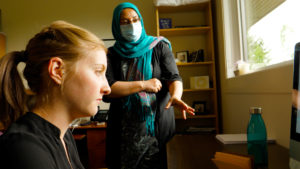Dr. Sarah Makhdoom has been practising in High River, Alberta since 2003. In that time, she has trained over 100 up–and–coming physicians. She points out to those students that rural practice is different, because you know your patients personally.
“When we were growing up as medical students, it was like ‘this is medicine, this is personal’,” says Dr. Makhdoom. “Keep [your practice and your personal life] separate. But when you become a rural physician you realize all that’s out the window.”
Dr. Makhdoom says she can go to the grocery store and easily see ten of her patients there. She will see them when she goes for a walk or run too.
“You pet their dog. Your parents get sick and [your patients] ask you how your parents are doing.”
It’s those beautiful little things that I know about my patients that will never be on their charts. – Dr. Sarah Makhdoom
For rural physicians, there is a personal connection with patients that you seldom find in urban centres. In rural communities, patients often bring baking and other gifts to their physician to show their appreciation.
“They put eggs on top of your car, because that’s their way of giving you a gift,” says Dr. Makhdoom. “Once I drove around with a carton of eggs on my car from the Hutterite Colony. They even knew which car to put it on.”

Dr. Makhdoom tells her students that knowing a patient on a personal basis means also knowing the rest of their family and knowing what issues in life they are facing. For example, are they recently unemployed? Did they just get married? Do they have an aging parent they are concerned about?
“So, it’s those beautiful little things that I know about my patients that will never be on their chart,” explains Dr. Makhdoom. “But I pass that on to my resident [physicians] when they are ordering all those fancy tests for them. I have to tell them this might not be appropriate because of this reason.”
If it means me driving out to her ranch to provide palliative care for her, well, lets do it. – Dr. Sarah Makhdoom
She provides the example of an elderly female patient who is a rancher and still runs 150 head of cattle.
“She will never go for a pacemaker,” says Dr. Makhdoom. “She will refuse that. And you cannot get her for cardiac rehab in the city, because she will not go. She would never move to a nursing home, because she wants to die on her own ranch.”
“So, I will support her in that decision. If it means me driving out to her ranch to provide palliative care for her, well, let’s do it.”
